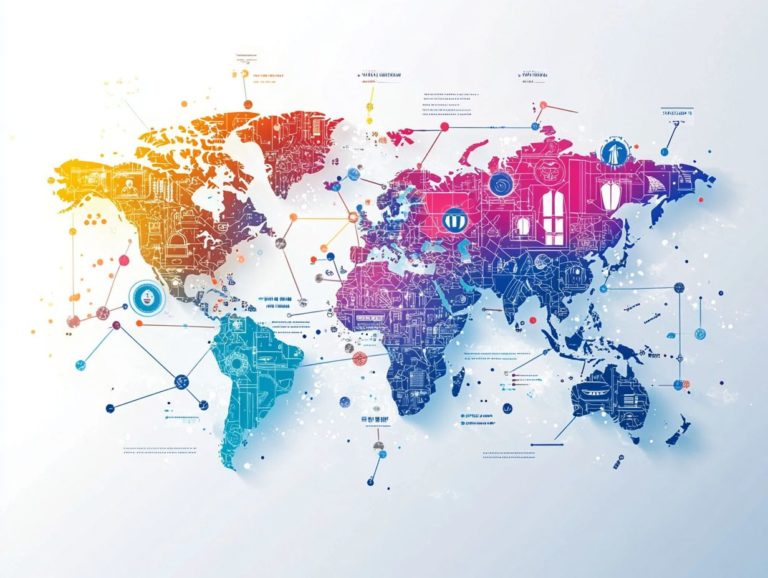5 Countries Leading in International IP Practices
In today s global economy, intellectual property (IP) is crucial for nurturing innovation and safeguarding creative assets. Get ready to explore five countries that are leading the way in IP practices: the United States, Japan, Germany, South Korea, and France! Don t miss out on learning how these nations can inspire you to strengthen your IP strategies.
You ll delve into the strengths and weaknesses of their IP frameworks. Compare their distinct approaches and highlight successful examples that truly set them apart. You will also find valuable lessons in what other nations can learn from these frontrunners.
Prepare to uncover the best practices in international IP management!
Contents
- Key Takeaways:
- 1. United States
- 2. Japan
- 3. Germany
- 4. South Korea
- 5. France
- What Are the Key Factors That Make These Countries Leaders in IP Practices?
- Frequently Asked Questions
- What are the top 5 countries leading in international IP practices?
- What sets these countries apart in IP practices?
- What are some notable IP achievements of these countries?
- What are some challenges facing these countries in terms of IP protection?
- What steps are these countries taking to address these challenges?
- What impact do these countries have on the global IP landscape?
Key Takeaways:
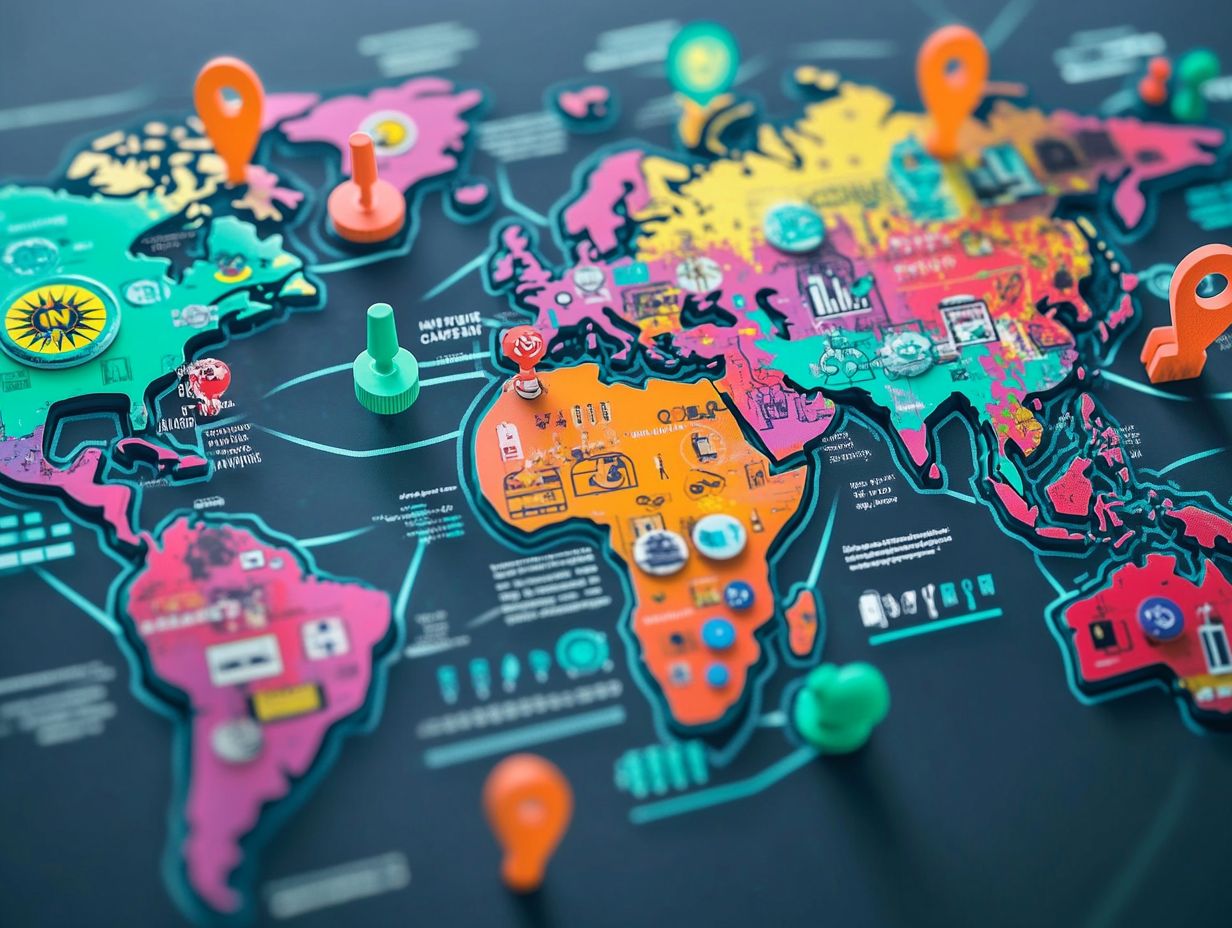
The United States, Japan, Germany, South Korea, and France are the top 5 countries leading in international IP practices.
Factors such as strong legal systems, robust R&D infrastructure, and a culture of innovation contribute to these countries’ leadership in IP practices.
While each country has its strengths and weaknesses in IP practices, they all prioritize protecting and promoting intellectual property rights.
1. United States
The United States has a strong system for protecting your inventions. This commitment is key to driving innovation and boosting the economy.
The legal rights you enjoy ranging from patents and trademarks to copyrights shield the interests of micro and medium-sized enterprises. They also help the U.S. shine on various enforcement indices from organizations like Statista and the World Intellectual Property Organization.
At the heart of this system is the United States Patent and Trademark Office (USPTO). It plays a pivotal role in administering these rights. By reviewing and granting patents, the USPTO encourages groundbreaking discoveries, while also facilitating the registration of trademarks that help your products and services stand out in the marketplace.
With effective enforcement mechanisms, such as anti-counterfeiting laws, you have the power to challenge infringements and protect your brand.
Take the Apple iPhone patent, which transformed personal communication. The Nike swoosh is more than a logo; it symbolizes athletic excellence. Both examples highlight how strong IP protections can fuel innovation and branding success.
2. Japan
Japan has crafted a sophisticated framework for intellectual property rights that prioritizes patents, trademarks, and copyrights. This creates a thriving business environment ripe for innovation and technological advancement.
This comprehensive system safeguards the creative ideas of inventors and nurtures a culture of research and development. It encourages companies like yours to invest in cutting-edge technologies.
The Japan Patent Office is central to this ecosystem. It efficiently processes patent applications and enforces rights, providing you with reassurance that your inventions are well-protected.
As a result, Japan consistently ranks high on the enforcement index. Notable innovations, particularly in robotics and electronics, showcase how robust IP protection has given power to companies, enhancing Japan’s global competitiveness and driving economic growth.
3. Germany
Germany’s intellectual property framework stands out for its strong legal protections that safeguard your inventions and innovations. This creates a flourishing business environment steeped in technological excellence.
This solid system is backed by effective enforcement mechanisms. They ensure your intellectual property rights are honored, swiftly addressing any violations that may arise.
The German Patent and Trademark Office plays a crucial role in this ecosystem. It offers valuable guidance and resources to innovators like you while overseeing patent and trademark registrations. This oversight enhances the predictability and reliability of the IP landscape.
Consider the success stories from the automotive and pharmaceutical sectors. They demonstrate how adhering to stringent IP policies enables companies to consistently innovate and broaden their market presence. These examples set a high standard for best practices in intellectual property management, illustrating the power of a strong IP framework in driving success.
4. South Korea
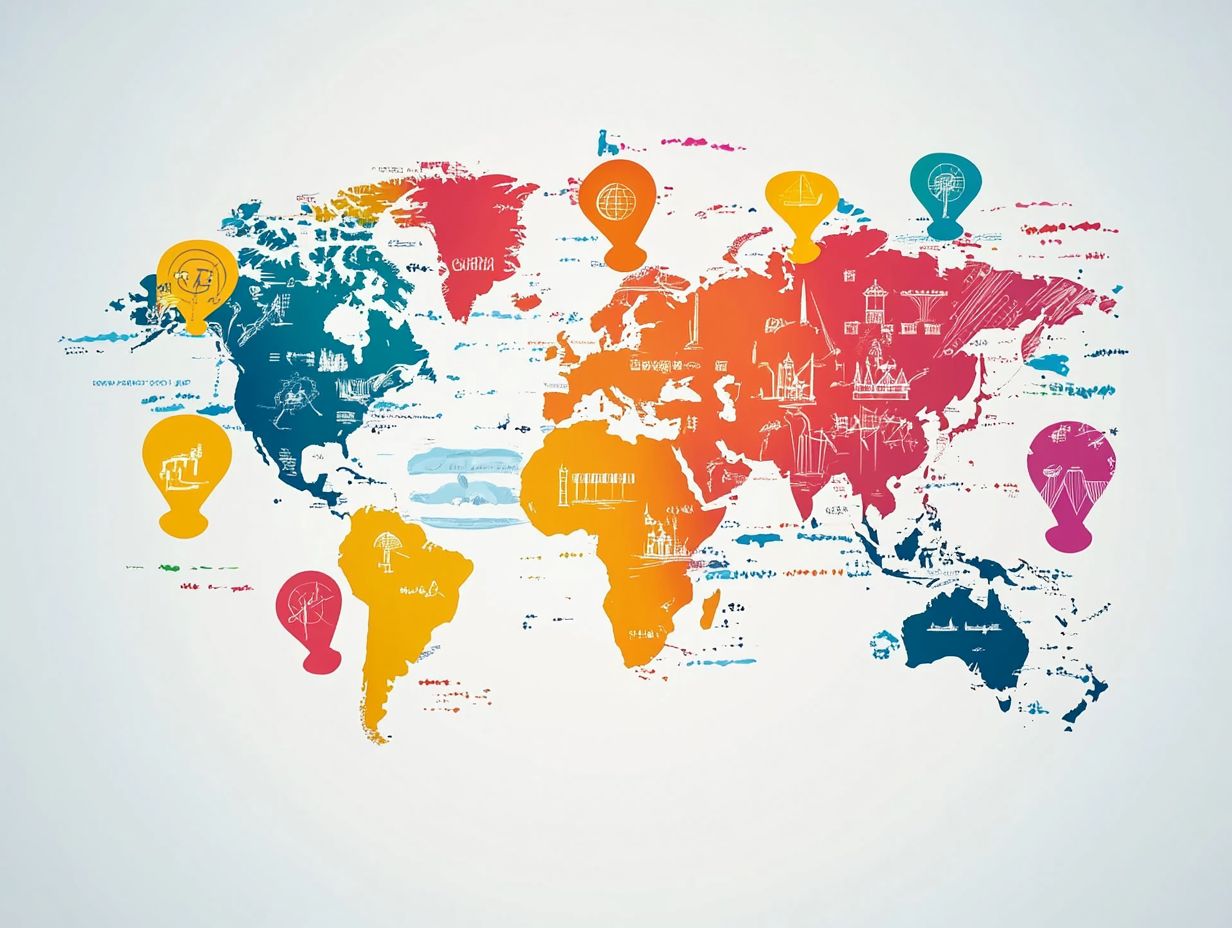
South Korea is a strong force in intellectual property rights. It uses a structured system of patents, trademarks, and copyrights to create an innovative and competitive business landscape.
At the heart of this vibrant ecosystem is the Korean Intellectual Property Office (KIPO). KIPO plays an essential role in overseeing IP laws and processes. It not only grants patents and trademarks but also offers invaluable resources and guidance to both startups and established companies.
Consider the examples of industry giants like Samsung and LG. They’ve adeptly leveraged their IP portfolios to maintain a competitive advantage in the global arena. This showcases how effective IP management can drive groundbreaking technological advancements and foster sustained economic growth.
These initiatives show how South Korea champions creativity and innovation, setting the stage for future breakthroughs!
5. France
France’s commitment to intellectual property rights shines through its comprehensive legal framework. This framework diligently safeguards patents, trademarks, and copyrights, creating an environment that nurtures creators and innovators like you.
The French National Institute of Industrial Property is your essential ally in navigating these laws. It offers invaluable guidance and resources for anyone keen on protecting their intellectual assets.
In terms of enforcement, France stands apart with robust mechanisms and a judicial system renowned for its efficiency in resolving IP disputes.
Consider the notable examples of French innovation in areas like culinary arts, fashion design, and high-end automotive engineering. These fields illustrate how the nation s steadfast dedication to intellectual property protection cultivates creativity and stimulates economic growth.
This framework gives the power to inventors and brands to thrive, solidifying France s stature as a global leader in innovation.
What Are the Key Factors That Make These Countries Leaders in IP Practices?
The leadership in intellectual property practices among nations like the United States, Japan, Germany, South Korea, and France stems from a blend of essential factors. These include effective enforcement mechanisms, comprehensive legal frameworks, and a business environment that nurtures innovation through strong protective measures for intellectual property.
These countries have strong enforcement systems that clearly reflect their commitment to upholding IP rights. This makes it increasingly challenging for infringers to operate without facing consequences. With detailed local IP laws often tailored to address the unique challenges businesses encounter in each market, the protections are significantly enhanced.
In contrast to regions with more lenient regulations, the legislative reforms in these nations showcase a proactive approach to IP management. They adeptly adapt to the swiftly evolving landscape of technology and commerce. This combination not only cultivates a culture of respect for intellectual property but also attracts international investment, further propelling advancements in innovation.
What Are the Strengths and Weaknesses of IP Practices in These Countries?
An analysis of the strengths and weaknesses in intellectual property practices across leading countries reveals a sophisticated landscape. Effective enforcement and robust legal frameworks coexist with challenges in compliance and adaptability to emerging technologies.
Take the United States, for instance. It exemplifies strong enforcement metrics that reflect a serious commitment to combating infringement. This is backed by a comprehensive legal framework that provides extensive protections for intellectual property rights holders.
In contrast, nations such as India encounter bureaucratic hurdles that can stall processes and complicate the enforcement of these rights.
Meanwhile, the EU has made noteworthy advancements in establishing legal protections for digital innovations. Yet it continues to wrestle with inconsistencies among member states and the ongoing challenge of addressing IP concerns arising from rapidly evolving technologies like artificial intelligence and blockchain.
These examples reveal the critical balance between harnessing strengths and tackling weaknesses in global intellectual property.
How Do These Countries Compare to Each Other in Terms of IP Practices?
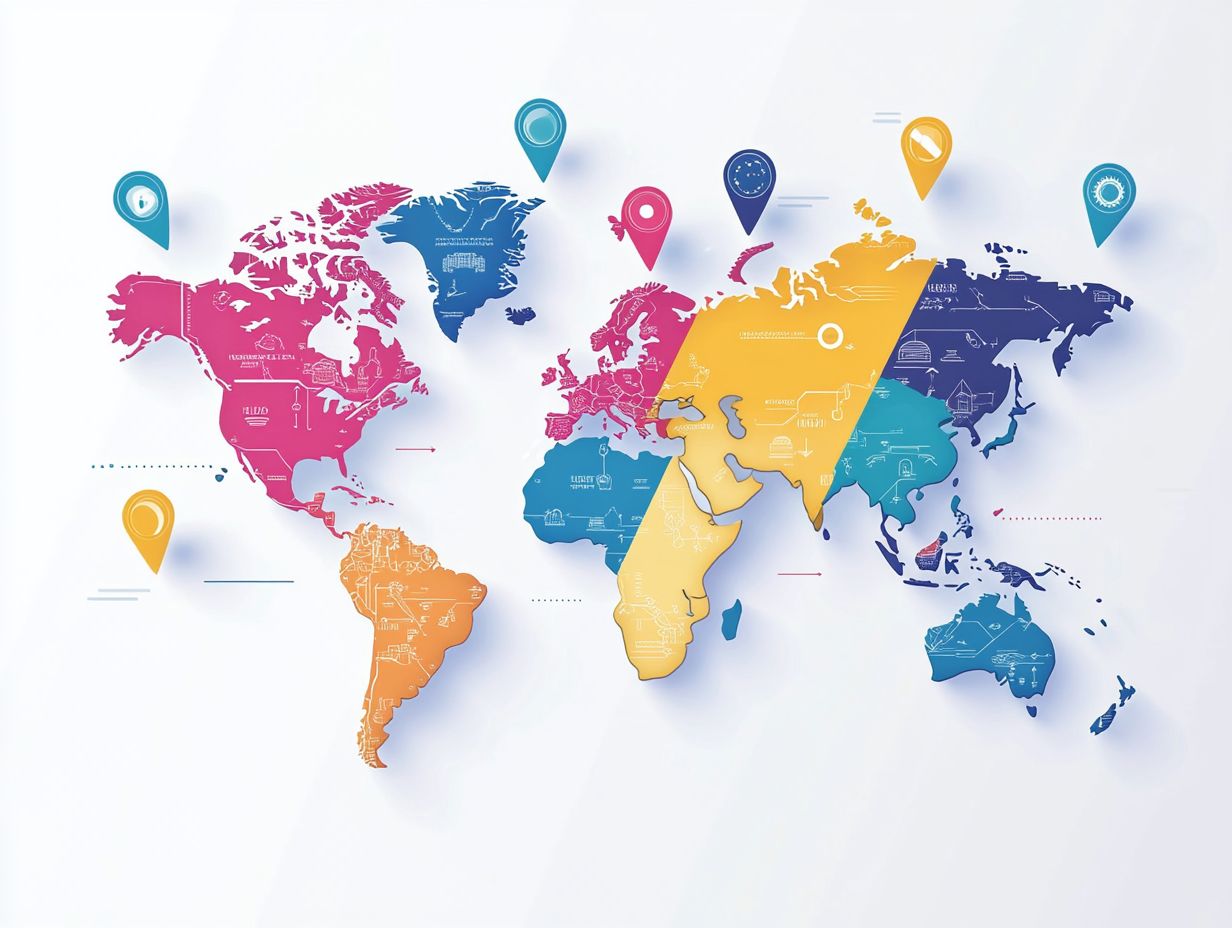
A comparative analysis of IP practices unveils distinct approaches and outcomes among countries such as the U.S., Japan, Germany, South Korea, and France. These countries showcase the varying effectiveness of legal rights in safeguarding intellectual property.
Each country has built its own laws to address the unique nuances of innovation and creativity within its borders. These laws mirror cultural attitudes toward ownership and reflect the economic priorities that drive growth.
Explore local laws, enforcement methods, and success rates for deeper insights. The disparities in legal protections and enforcement methods provide invaluable lessons for businesses and policymakers navigating the global market.
What Are Some Examples of Successful IP Practices in These Countries?
Successful IP practices from the United States, Japan, Germany, South Korea, and France offer a compelling blueprint for how effective legal frameworks can foster innovation and protect creators’ rights. This is achieved through legal protections for inventions, brand names, and artistic works.
Take the United States, for instance. The robust enforcement of patents has catalyzed breakthroughs in technology and pharmaceuticals. Companies can develop life-saving medicines thanks to strong patent rights.
In Japan, the unwavering commitment to IP protection has spurred advancements in robotics and manufacturing, playing a pivotal role in its economic success.
Germany, often hailed for its engineering prowess, capitalizes on trademark protections that bolster its automotive industry. Brands like BMW and Mercedes-Benz command recognition and trust.
Meanwhile, South Korea’s local IP office has been crucial in cultivating a vibrant IT sector. It provides innovative startups with a secure environment for their creations.
France has made significant strides in safeguarding artistic works, fueling growth in its creative industries.
Together, these nations show us how smart IP practices can boost economies and inspire innovation!
How Can Other Countries Learn from These Leaders in IP Practices?
Emerging countries aiming to enhance their intellectual property practices can gain invaluable insights from the frontrunners in IP rights. By focusing on legislative reforms and fostering cooperation among users, they can set the stage for success.
To reach these goals, implementing transparent and efficient processes ensures swift resolution of disputes. This ultimately builds trust among creators and innovators.
Consider leveraging technology to streamline applications and enhance access to resources. Establish public-private partnerships to facilitate knowledge sharing and capacity building, empowering stakeholders to navigate the complexities of IP management with confidence.
By creating incentives for collaboration among inventors, you can encourage innovative solutions that benefit a wider community, thereby further strengthening the intellectual property ecosystem.
Frequently Asked Questions
What are the top 5 countries leading in international IP practices?
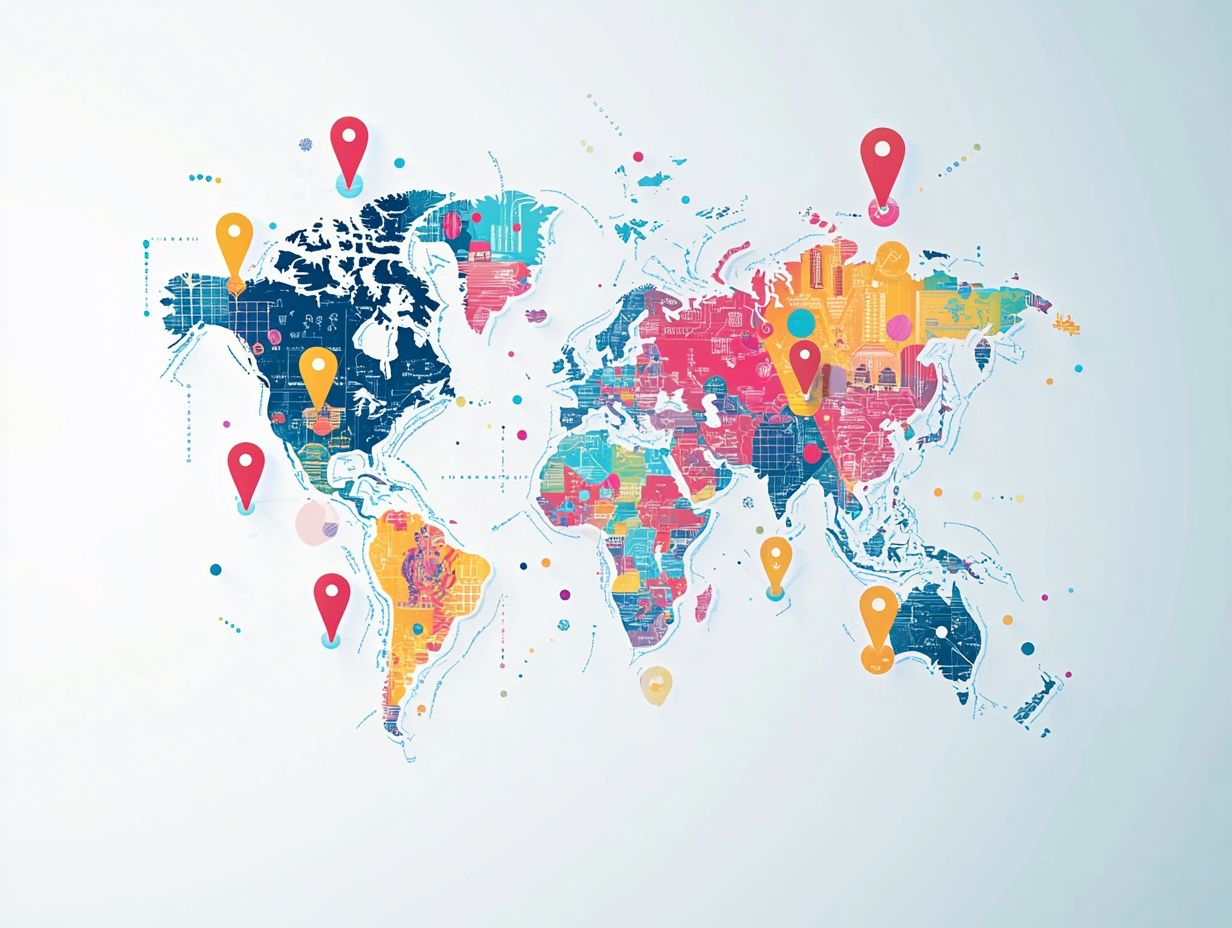
The top 5 countries leading in international IP practices are the United States, Japan, Germany, France, and South Korea.
What sets these countries apart in IP practices?
These countries have strong laws, significant research investments, and a high number of patents filed and granted.
What are some notable IP achievements of these countries?
The United States has the most patents granted, Japan has the most trademarks registered, Germany has the most utility models registered, France has the most industrial designs registered, and South Korea has the most international patent applications filed.
What are some challenges facing these countries in terms of IP protection?
Global trade is growing rapidly. This growth presents challenges in protecting Intellectual Property (IP) rights, such as counterfeiting, piracy, and trade secret theft.
What steps are these countries taking to address these challenges?
These countries have tightened IP laws and regulations. They are also enhancing collaboration and enforcement efforts while investing in technology to fight IP infringement.
What impact do these countries have on the global IP landscape?
These countries are setting a strong standard for IP protection and enforcement. Their practices significantly influence the global economy and technological advancements.






